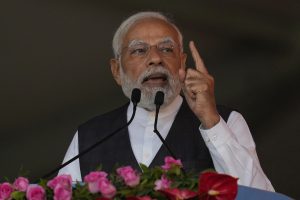In the middle of last month, the Indian government hosted the online “Voice of Global South Summit: for Human-Centric Development,” which brought together more than 120 ministers and leaders. Along with an in-person summit meeting, the conference consisted of 10 sessions, addressing key topics such as the global economy and climate change, rising inflation, energy and food issues, and the debt problems that are plaguing many developing countries.
The summit underscores India’s aspirations, as chair of the G-20, to set the agenda as a representative of the Global South. In addition to Prime Minister Narendra Modi, the presidents of Guyana, Vietnam, Mozambique, Senegal, and Uzbekistan as well as the prime ministers of Bangladesh, Cambodia, Thailand, Mongolia, and Papua New Guinea took part in the in-person summit held on the first day. One could quibble over the number of leaders present, but India was nonetheless pretty clearly taking advantage of the opportunity of its tenure as G-20 chair to engage in active diplomacy to realize its agenda.
China did not participate in the conference. There was some talk that it had been excluded, but China’s Ministry of Foreign Affairs denied this through a spokesperson, who said that “India has informed China of its considerations and plan for hosting the summit.” The spokesperson added that China shares the sentiment of valuing developing countries, but did not clarify why it had not participated.
Many Chinese media outlets have interpreted this as meaning that China wasn’t invited, although New Delhi had notified Beijing of its plans in advance. China wasn’t the only country not invited: Brazil, another G-20 member, and Pakistan, a neighbor with which India has a hostile relationship, also did not receive invitations. Indian media outlets offer varying interpretations, with some saying that China supported the conference, others only noting that China was notified in advance and still others saying that China was indeed snubbed.
If Chinese media reports are to be believed, and China and other major Global South players were not invited by India, that would suggest that India seeks to establish itself as the leader of the developing world. Chinese media say that China has not openly protested at this, demonstrating its “great power style.” But what is really going on?
First, China and India want to avoid further clashes arising from their border dispute, and China doesn’t want to use a snub – real or perceived – to further aggravate its relations with India.
Second, since China is similarly seeking to act as a leader among emerging and developing nations, India’s actions set up a rivalry. However, bringing that rivalry into the open could see China embroiled in a new confrontation at a time when it already faces intensifying competition with the United States and strained relations with developed countries.
What has become clear from this incident is that at a time when its relations with the United States and other developed countries are increasingly strained, China is not completely aligned with Russia but yet feels unable to untangle itself from that relationship altogether. Meanwhile, although there are border issues with India, China is also trying to prevent that hostility from poisoning overall Sino-Indian relations.
The downturn in relations with the United States and other developed countries is problematic because it narrows China’s diplomatic options and makes it harder to keep ties with emerging and developing countries from deteriorating. Given that China also seeks to be a leader of the Global South, any worsening of relations could become its Achilles heel.

































